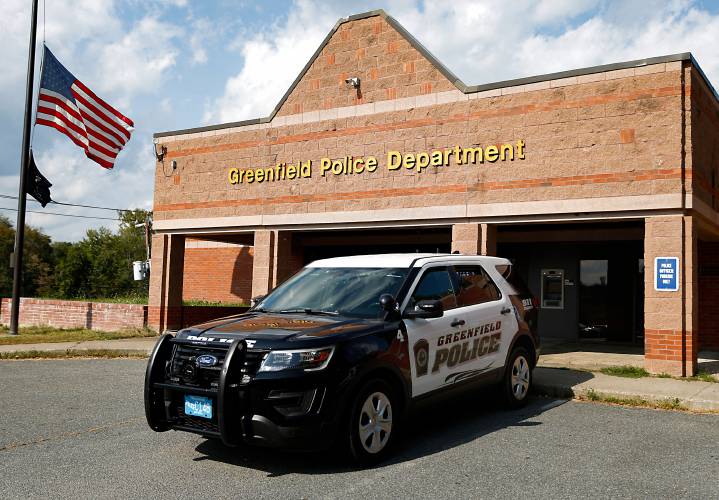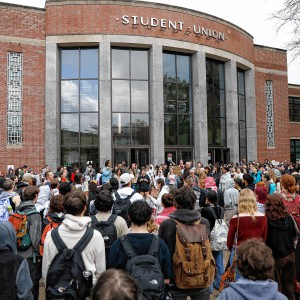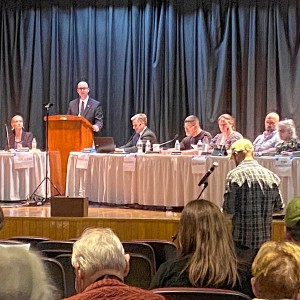Greenfield city councilors criticize police raises as ‘tone-deaf’ following discrimination verdict

The Greenfield Police Station on High Street. STAFF FILE PHOTO/DAN LITTLE
| Published: 01-17-2024 6:08 PM |
GREENFIELD — City councilors are calling the $33,000-plus raises negotiated late last year between the former mayor and top police officers as a “tone-deaf” attempt at a “cash grab.”
“The idea that the leadership should be getting this kind of raise is tone-deaf considering the political situation, but it’s also against the Police Department in the sense of it not being able to fund other requirements of the police by doing so,” At-Large Councilor John Garrett said at the Ways and Means Committee meeting Tuesday evening.
As part of two memorandums of understanding (MOUs), signed last year by then-Mayor Roxann Wedegartner during one of her final months in office, the final year of Police Chief Robert Haigh Jr.’s three-year contract would include a $33,901 increase to his base salary as a result of an education incentive; Deputy Police Chief William Gordon, meanwhile, would see a $35,255 increase. Both also negotiated a $750 physical fitness incentive, requiring each of them to pass an annual physical fitness test. The raises were to go into effect Jan. 1, according to the memorandums, but funding the agreements requires City Council approval.
Wedegartner previously said that in negotiating these increases, Haigh agreed to a 0% increase to his base salary for the subsequent three years — that includes waiving the typical 3% annual increase for department heads — and Gordon agreed to do the same for one year of his next contract.
Those increases, in addition to the standard 3% longevity increase, would bring their annual salaries this year to $215,742 and $181,196, respectively.
“That’s two people’s salaries,” Garrett said. “The bullying that happened when the City Council cut the police’s budget in regards to the racial animus trial … The fact they cut the night shift and yet they’re pulling down salaries like this and have the gall to try for a cash grab, it boils my blood.”
Garrett was referring to the City Council’s vote in May 2022 to reduce the Police Department budget by $400,000 for salaries and $25,000 in expenses. According to councilors at the time, the cut was meant to signal that “major change” was needed in the department following the jury verdict in Hampshire County Superior Court that found the chief and the Greenfield Police Department racially discriminated against former Officer Patrick Buchanan and that the city was liable for racial discrimination during the promotional process for sergeants.
In January 2023, Haigh and Wedegartner presented a plan to City Council — which they argued was necessitated by the budget cuts — that would eliminate local police patrols between 11 p.m. and 7 a.m. from March 1 to June 30. They revised the plan a week later to temporarily shift the department’s schedule to two, 10-hour shifts: 7 a.m. to 5 p.m. and 5 p.m. to 3 a.m. State Police would respond to calls as needed between 3 and 7 a.m.
Article continues after...
Yesterday's Most Read Articles
 Political newcomer defeats Shores Ness for Deerfield Selectboard seat
Political newcomer defeats Shores Ness for Deerfield Selectboard seat
 South County Senior Center opts not to renew church lease after rift over LGBTQ program
South County Senior Center opts not to renew church lease after rift over LGBTQ program
 More than 130 arrested at pro-Palestinian protest at UMass
More than 130 arrested at pro-Palestinian protest at UMass
 As I See It: Between Israel and Palestine: Which side should we be on, and why?
As I See It: Between Israel and Palestine: Which side should we be on, and why?
 Moratoriums on large-scale solar, battery storage passed in Northfield
Moratoriums on large-scale solar, battery storage passed in Northfield
 Bridge of Flowers in Shelburne Falls to open on plant sale day, May 11
Bridge of Flowers in Shelburne Falls to open on plant sale day, May 11
Councilors at the time noted their frustration that at no point had a financial order been put forward by Wedegartner to appropriate money that might have prevented such drastic changes to the overnight shift.
According to Mayor Ginny Desorgher, who served as a city councilor during the budget discussions in May 2022, the legal opinion she received from Sullivan, Hayes & Quinn stated the city has a strong legal argument that the memorandums are not binding on her administration.
“Nevertheless, because the MOUs require an appropriation, I decided the legally prudent action to take was to present them for an appropriation vote,” Desorgher said. “These MOUs do not supersede the City Council’s appropriation power.”
To fund the agreements, Desorgher put forward a financial order to transfer $54,901 from the city’s reserve fund to cover the increases through the remainder of the current fiscal year, which ends June 30. A year-to-date report through December 2023 indicates there is $75,000 available in the city’s reserve account.
Though no votes on the financial order were taken by councilors at the Ways and Means Committee meeting on Tuesday evening, a first reading of a motion was expected Wednesday night with a vote on the appropriation anticipated at the February City Council meeting.
“A ‘no’ vote will not approve the money necessary to fund Chief Haigh’s MOU, dealing with education and fitness, or Deputy Chief Gordon’s contract addendum,” Desorgher said.
It’s unclear, however, whether a third memorandum signed by Wedegartner before she departed from office was legally binding on Desorgher’s administration, particularly as there is no financial component. This MOU addresses the policy for disciplinary proceedings for the deputy chief.
“Though we don’t get to vote on the one without appropriation, it is an interesting thing to point out it was dated June 20 and … and for some reason, [the MOU] didn’t get received by the clerk until Nov 7,” said At-Large Councilor Michael Terounzo. “Interesting date to receive it.”
Desorgher defeated Wedegartner in the Nov. 7 mayoral election.
“This year was a little bit weird because it was a busy year for everybody,” Wedegartner said by phone on Tuesday when asked about the timing of the MOUs. “I was busy both because of the campaign and being mayor, so it probably did happen later.”
Garrett added that the MOU concerning disciplinary proceedings states that the deputy chief may appeal any disciplinary, discharge or non-reappointment, with the city expected to cover half the cost of any related proceedings.
“He could be a lovely human and maybe very much is, but that’s not good policy for any … public servant to have that protection,” he said.
Human Resources Director Diana Letourneau confirmed for councilors that the local patrol officers union and supervisors union negotiated an education incentive in their last round of negotiations.
Still, councilors emphasized their frustration with the appearance of politics being played by the former city administration. Precinct 8 Councilor Lora Wondolowski described the inclusion of educational incentives as “a workaround” for raises they may not otherwise have been afforded.
“Every single piece of this is rotten, and then you add just being tone-deaf to what people in town are saying,” she said, also referencing the temporary elimination of the overnight shift last winter. “I’m just really saddened.”
Reporter Mary Byrne can be reached at mbyrne@recorder.com or 413-930-4429. Twitter (X): @MaryEByrne.

 Retired police officer, veteran opens firearms training academy in Millers Falls
Retired police officer, veteran opens firearms training academy in Millers Falls No surprises in Wendell election
No surprises in Wendell election New Salem election ushers in new Selectboard member
New Salem election ushers in new Selectboard member
